γαλλικές εκλογές απο D.WELLE
Sarkozy and Royal in Runoff Election for French Presidency
Conservative Nicolas Sarkozy and his socialist rival, Segolene Royal, got the most votes in Sunday's election and will face each other in the second vote for the French presidency on May 6.
Sarkozy and Royal finished first and second respectively in Sunday's first round of the French presidential election.
Sarkozy was credited with about 30 percent of the vote and Royal picked up about 25 percent. They will now square off on May 6 as French voters elect the next head of state for the coming five years.
Centrist Francois Bayrou came in third, with about 18 percent, with right-wing extremist Jean-Marie Le Pen finishing a distant fourth, at around 11 percent.
Sarkozy's new dream
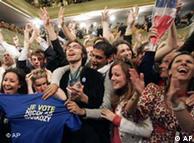 Bildunterschrift: Großansicht des Bildes mit der Bildunterschrift: Sarkozy supporters cheered on Sunday
Bildunterschrift: Großansicht des Bildes mit der Bildunterschrift: Sarkozy supporters cheered on Sunday
Sarkozy told cheering supporters of his center-right Union for a Popular Movement (UMP) that he wanted to rally the French people behind a "new dream."
France must now choose between two visions of society in the second round, Sarkozy said.
"By placing me in the lead and Madame Royal in second position, (voters) clearly marked their wish to have a definitive debate on two ideas of the nation, two projects of society, two value systems," he said.
Advantage: Sarkozy
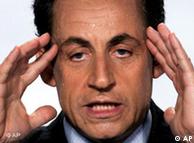 Bildunterschrift: Großansicht des Bildes mit der Bildunterschrift: Sarkozy doesn't have too worry too much, analysts say
Bildunterschrift: Großansicht des Bildes mit der Bildunterschrift: Sarkozy doesn't have too worry too much, analysts say
Analyst said that Sarkozy was now a clear favorite to be France's next president.
According to a telephone poll conducted after Sarkozy and Royal were declared winners, Sarkozy would get 54 percent while Royal would only get 46 percent of the vote on May 6.
"It's clear there is a big advantage for Sarkozy," Jean-Philippe Roy, a politics professor at Tours university, told AFP news service. "The whole left-right balance in the country has shifted. It is really a historic moment."
Simple arithmetic works in Sarkozy's favor, others said.
"What we have set up for round two is a clear right-left showdown, but it is a showdown which I find hard to see how the left can win," said Dominique Moisi of the French Institute for International Affairs, according to AFP. "The left are clearly a minority in the country. If you add right, far-right and half the center, Sarkozy is in an extremely comfortable position. His decision to court the far-right vote has clearly paid off."
Although Sarkozy has the lead, analysts agreed that the race is not yet won. This is because of the deep mistrust with which the former interior minister is regarded by many voters -- even by some who support his ideas.
"We have today a political situation I have never seen: a man who is highly likely to be the next president but who provokes unprecedented levels of hatred and rejection," said Dominique
Reynie, professor at the Paris School of Political Sciences.
"This is the moment for Sarkozy to start talking to the French people -- not just to his own camp," he added. "He's got to look like a president, which in France means someone who has the nation behind him. From now on it's not his policies, but his personality that's the issue."
Royal reaches out
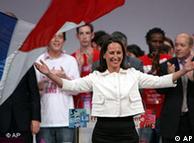 Bildunterschrift: Großansicht des Bildes mit der Bildunterschrift: Royal hopes to become France's first female president
Bildunterschrift: Großansicht des Bildes mit der Bildunterschrift: Royal hopes to become France's first female president
Speaking to her Socialist Party supporters in the small town of Melle in western France, Royal called for voters to rally round her for the presidential runoff, promising to bring France change without upheaval.
"I call on all those who ... believe it is possible to reform France without brutalizing it, who want a triumph of human values over the stock market, who want an end to the painful rise of insecurity and precariousness, to come together," she said. "I reach out to all those who believe it is not only possible but urgent to break with a system that is no longer working"
After a disastrous start to her campaign, Royal's result was impressive, as she is credited with about nine percent more of the vote than the Socialist candidate in 2002, Lionel Jospin, received.
Many voters certainly remembered the first round of the 2002 presidential election, when Le Pen caused a political earthquake by outpolling Jospin to make it to the run-off.
In 2002, left-wing candidates other than Jospin garnered an impressive 26.71 per cent of the vote, while the Socialist received only 16.18 per cent.
This year, three Trotskyist candidates, the Green Party standard-bearer and anti-globalization activist Jose Bove picked up only about 11 percent of the vote.
Record turnout
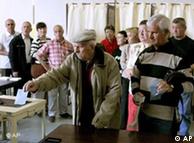 Bildunterschrift: Großansicht des Bildes mit der Bildunterschrift: French voters came out in record numbers
Bildunterschrift: Großansicht des Bildes mit der Bildunterschrift: French voters came out in record numbers
The memory of 2002 no doubt also contributed to a voter participation rate that was near an all-time high for a first-round election in postwar France, with an estimated 84.5 percent of the country's 44.5 million registered voters casting their ballots on Sunday.
The previous record was 84.75 percent, set in 1965.
Five years ago, only 71.6 percent of registered voters went to the polls in the first round.
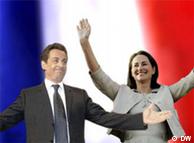
Comments